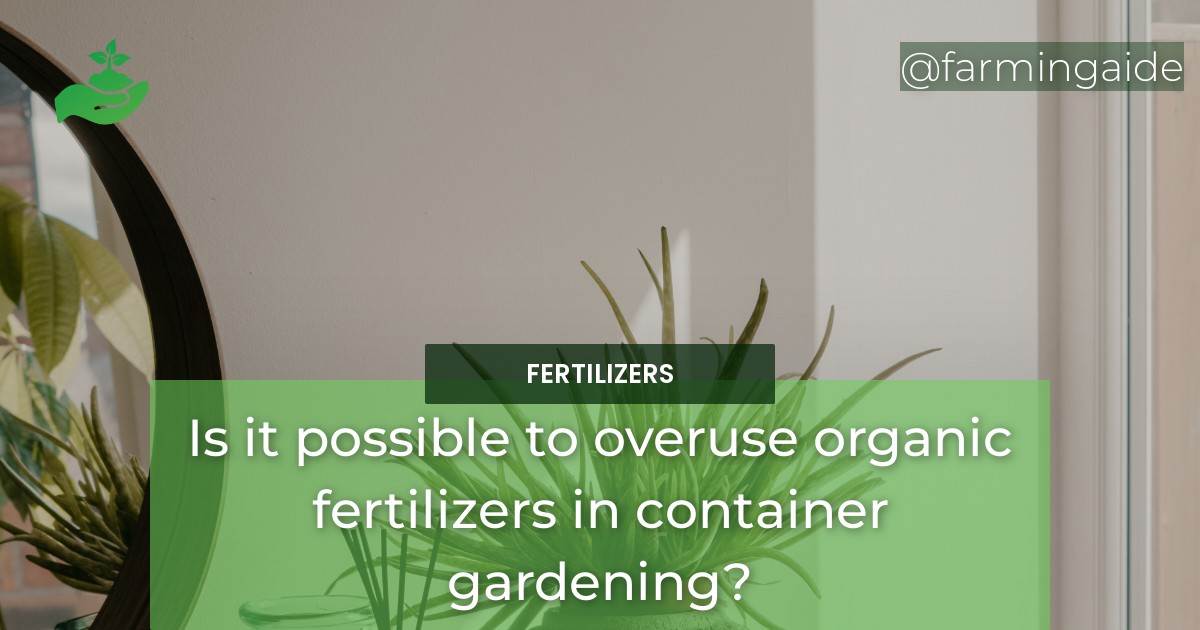Container gardening is a popular and convenient way to grow plants, herbs, and vegetables in limited spaces. Organic fertilizers are a great choice for container plants as they provide essential nutrients while also being environmentally friendly. However, overusing organic fertilizers in container gardening can pose potential risks and challenges. In this article, we will explore the potential risks of excessive organic fertilizer use and how to balance organic fertilizers for container plants.
Potential Risks of Excessive Organic Fertilizer Use
Increased Salinity Levels
Over-fertilization can lead to a build-up of salts in the soil, which can cause harm to the roots of container plants. High levels of salt can create an imbalance of water intake, leading to dehydration and wilting of the plants.
Nutrient Imbalances
Overusing organic fertilizers can cause nutrient imbalances in the soil, which can lead to stunted growth, yellowing of leaves, and reduced fruit production. Too much nitrogen can promote vegetative growth at the expense of fruits or flowers, while inadequate phosphorous can hinder root development and lead to weak plants.
Root Burn
Excessive use of organic fertilizers can cause root burn, which happens when the roots come into contact with a concentration of fertilizer that is too high. Root burn can lead to root damage and death if left unchecked.
Environmental Pollution and Health Risks
Over-fertilization can also lead to environmental pollution and potential health risks. Excess nutrients can leach into groundwater, causing algae blooms and depleting oxygen levels. Nutrient runoffs can also contaminate waterways, leading to fish kills and other ecological damages. High levels of nitrogen and phosphorus can also contribute to air pollution, leading to respiratory problems and other health hazards.
Costly and Wasteful
Overusing organic fertilizers can be costly and wasteful. Applying more fertilizer than a plant needs does not improve its growth or productivity, but rather wastes the fertilizer and pollutes the environment. It can also lead to a build-up of salts and other chemicals in the soil, which can harm future crops.
Balancing Organic Fertilizers for Container Plants
Understanding NPK Ratio and Micro-nutrients
It is essential to understand the NPK ratio and micro-nutrient requirements of container plants before applying organic fertilizers. The NPK ratio stands for Nitrogen, Phosphorus, and Potassium, which are primary macronutrients that plants need to grow. The ratio varies depending on the type of plant and its growth stage. Micro-nutrients, such as calcium, magnesium, and iron, are equally important but needed in smaller amounts.
Proper Application and Timing
Proper application and timing of organic fertilizers are crucial for container plants. It is recommended to use slow-release organic fertilizers that release nutrients over time, rather than a single application. Applying fertilizer at the right time ensures that the plants receive the nutrients when they need them the most. Too much fertilizer or applying at the wrong time can lead to nutrient imbalances, root burn, and other risks.
Alternative Options
There are alternative options to using organic fertilizers in container gardening. Composting is an excellent way to provide organic matter and nutrients to container plants. Vermicomposting, or using worms to break down organic matter, is also effective in providing nutrient-rich soil for container plants.
Testing Soil and Plants for Optimal Fertilizer Levels
Testing soil and plants for optimal fertilizer levels is an effective way to ensure that container plants are receiving the right nutrients. Soil tests can measure pH levels, nutrient deficiencies, and excesses, helping gardeners adjust fertilization levels accordingly. Plant tissue tests can also determine nutrient deficiencies or excesses, providing valuable insight into the plant’s overall health.
ALSO READ
Conclusion
Overusing organic fertilizers in container gardening can pose potential risks and challenges. Excessive use of organic fertilizers can lead to nutrient imbalances, root burn, environmental pollution, and health risks. Balancing organic fertilizers for container plants requires an understanding of NPK ratios and micro-nutrients, proper application and timing, alternative options, and testing soil and plants for optimal fertilizer levels. By following sustainable practices and applying organic fertilizers correctly, gardeners can ensure healthy and productive container plants while also protecting the environment.


